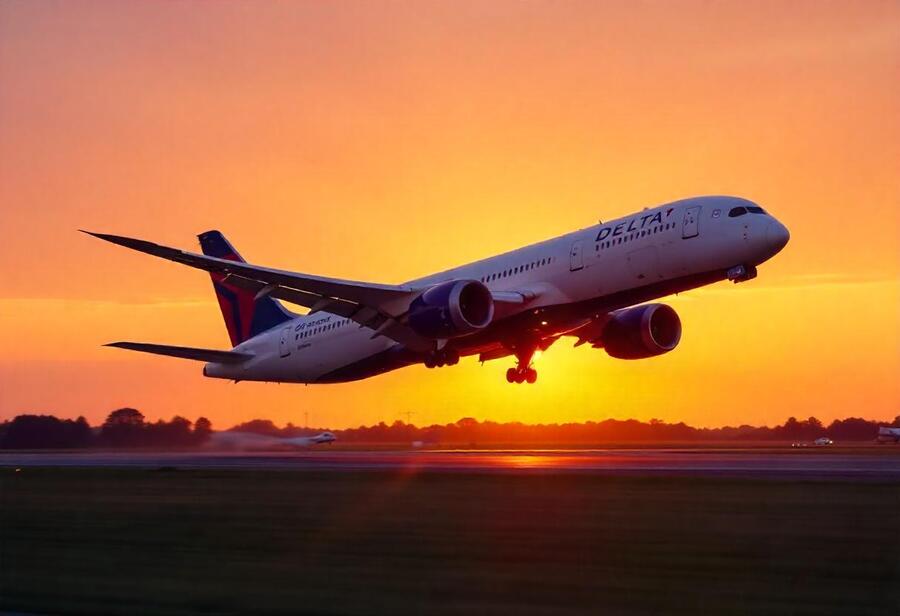Home » AIRLINE NEWS » Airline News of US » Delta Air Lines Announces Global Expansion with Three New Routes, Los Angeles to Hong Kong, Atlanta to Tel Aviv and Atlanta to Riyadh: You Need to Know
Saturday, July 12, 2025
Delta Air Lines makes a big push to increase its worldwide reach by launching three top-priority intercontinental routes, from Atlanta to Tel Aviv and Riyadh, and from Los Angeles to Hong Kong. The expansion brings back the carrier to key long-haul marketplaces from which it exited or never served, spurred by a boost in intercontinental travel demand, shifting geopolitical tides, and an increased focus on one-stop intercontinental connections from key US hubs.
Rekindling Transpacific traffic: Hong Kong to Los Angeles
Delta’s Hong Kong return schedules a significant return to the Asia-Pacific region. The carrier previously suspended service to the city in 2018, and the airline appears set to resume its direct service between Hong Kong International Airport (HKG) and Los Angeles International Airport (LAX). The new flight will be flown using the Airbus A350-900, which is a long-range, fuel-efficient aircraft capable of traveling long distances over long periods of time.
The route extends over 7,200 miles and provides a tactical opportunity to Delta to return to one of Asia’s most important monetary and commerce hubs. While launch details have not been verified, industry sources feel the announcement could come shortly, and that will signify a new effort to compete within the transpacific busy corridor.
Changing Hubs: From Seattle to Los Angeles
What’s different about the relaunch is the shift of gateway. Rather than reviving the Seattle route, which was an old Delta gateway to Asia, the airline is returning to its resilient West Coast hub Los Angeles. As one of the largest West Coast hubs, LAX has over 150 daily flights and a large domestic network and thus provides a broader base of connecting traffic and stronger demand from Southern California’s large Asian-American populations.
Seattle-Hong Kong service was poor before, caused by minimal feeder traffic and weak demand. On the contrary, LAX offers better commercial viability and broader long-haul service justification, especially when combined with cargo incomes and one-stop passenger flows.
Crowded Skies, Competitive Airline Industry
LAX–HKG market has not been a very appealing one to enter. The flight is served by a number of other major airlines to date. Cathay Pacific operates three flights daily between the cities, and United Airlines operates a number of flights as well. Previous efforts by other U.S.-based airlines to maintain the flight have been short-lived due to there not being much demand or too much competition.
Unlike its rivals that have strong Asian regional networks, Delta lacks strong alliance links within Hong Kong. That makes it hard to appeal to transit passengers and sets a limit to its appeal to premium travel by providing seamless connections outside Hong Kong. Delta will need to rely on origin-and-destination traffic and the quality of its LAX hub instead.
Middle East Focus: Delta Expands from Atlanta to Tel Aviv and Riyadh
Alongside its Asia-Pacific expansion, Delta will also debut two flagship long-haul routes from Hartsfield-Jackson Atlanta International Airport (ATL) to Tel Aviv (TLV) and Riyadh (RUH). The planned launches would further Delta’s foothold in the Middle East and complete its growing international lineup.
The Tel Aviv flight would provide useful connectivity to Israel, providing a one-stop flight from the Southeast U.S. to a significant religious and business hub. The Riyadh flight, meanwhile, would provide Delta with its first access to Saudi Arabia—a growing air market powered by ambitious governmental initiatives to speed up inbound travel and economic diversification.
Turning a New Page on Gulf Partnerships
Delta’s goal to reach Riyadh is a distinct change of strategy. The U.S. airlines, such as Delta, so far opposed Gulf carriers that they thought too heavily subsidized. Delta will now likely collaborate on the Riyadh route with a Saudi state-backed carrier—a strategy that contrasts radically from its previous one.
The partnership shift occurs within an industrywide movement from conflict to collaboration, especially as carriers seek to access new overseas markets. The partnership success would give Delta a much-needed toehold within the changing skies of the region.
Operation Planning and Cultural Aspects
Services to Saudi Arabia include logistics and cultural challenges. Doing business within a region whose codes of law and conservatism are strong requires cautious planning. Delta should offer its crews egalitarian and safe workspaces, especially since work groups increasingly take note of work conditions overseas.
Transparency in dealing with these matters will prevent reputational risk and ensure the carrier upholds its global employee standards.
Getting Ready for the Next Phase of International Growth The new long-haul routes to Hong Kong, Tel Aviv, and Riyadh are not just new places, however, they are tactical moves that are part of an overall shift within Delta’s international strategy. Leveraging its flagship U.S. hubs and new aircraft, the carrier is in good position to challenge competitors on a number of the most valuable and contested routes globally. These scheduled service announcements evidence that not only is Delta recovering from recent losses, it’s going straight for new growth prospects. Conclusion Delta Air Lines is charting the course to a new global era. With its eyes on Asia and the Middle East, the airline is moving cautiously to increase its global reach. Successful long-distance expansion ventures will further strengthen Delta’s global reach, open new marketplaces, and give customers new options on continents where the necessity to travel by plane continues to increase.
